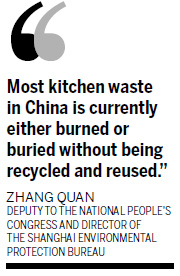Society
Kitchen waste recycling rules are key ingredient
By Qian Yanfeng (China Daily)
Updated: 2011-03-21 08:30
 |
Large Medium Small |
|
 A worker uses a forklift truck to pour materials into a waste processing machine at the Gao'antun Kitchen Waste Processing Plant in Chaoyang district, Beijing, in July. The plant, which is the largest in China, is able to process 400 tons of waste a day. It began trial operations in July and formal operation started in September. [Photo / Xinhua] |
BEIJING - China should bring in national standards to regulate the recycling of kitchen waste in order to protect public health while promoting the reuse of valuable materials, said a national legislator.
"The lack of standards in regulating the way such waste is recycled is one major hurdle."
Kitchen waste, which is also referred to as wet waste, comprises such things as leftover food and fruit peel and makes up 63 percent of household garbage in Shanghai.
Zhang said it could be turned into animal feed additives and organic fertilizer. Once it is separated from dry waste, the handling of that waste would also be simplified and sped up, he said.
"Without national standards, it's hard for the government to evaluate the quality of recycled products," he explained. "They could then run the risk of endangering public health because substandard recycled products could enter the food chain."
|
 |
Zhang said the lack of regulations and subsequent underdevelopment of the recycling industry was holding back investment.
"It means it will be difficult for technologies involved in the recycling sector, and the recycled products, to be promoted on a large scale," he said.
Since 2000, Shanghai has collected and recycled 1.2 million tons of kitchen waste - mainly from big restaurants - which is a small amount compared to the actual quantity of kitchen waste across the city, he explained.
The city currently produces more than 7 million tons of household garbage a year or some 20,000 tons a day. That equates to more than a kilogram a day per person.
The massive production of waste is putting pressure on the city's waste treatment facilities, which are supposed to handle a maximum of 18,000 tons a day.
"We're therefore promoting a garbage classification system in the city that can effectively reduce the amount of waste being treated while promoting resource recycling," said Zhang.
By the end of this year, 500,000 households in 1,000 residential communities will be asked to divide their household garbage into wet and dry waste, the Shanghai greenery and public sanitation bureau said in mid-January. The move is widely expected to facilitate the city's efforts to promote kitchen waste recycling.
But the current plan is not as ambitious as the earlier aims of the local authorities that had wanted a full four-category waste separation system across the city. That idea failed to win support from residents because of their lack of knowledge about waste separation.
Zhang said the time is right for the Ministry of Agriculture to work out a set of national standards governing the recycling of kitchen waste because several Chinese cities are now launching pilot projects for kitchen waste recycling.
Zhang also called on related government departments to combat the use of "drainage oil," which he said poses a serious health risk.
Drainage oil is made from discarded kitchen waste that has been refined. It is reportedly commonly used by small restaurants because it is cheaper than fresh oil.
While the oil may look clean, it contains toxic substances, including aflatoxin, which can cause cancer, he said.



